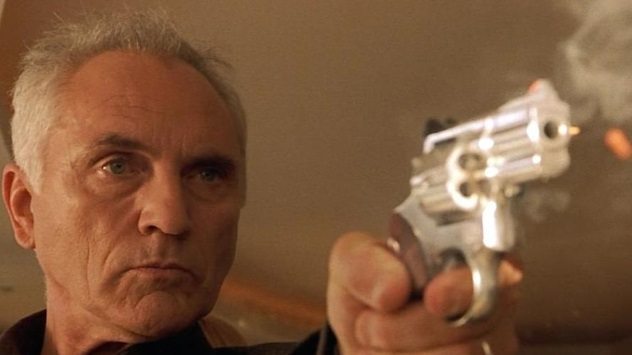 History
History  History
History  Movies and TV
Movies and TV 10 Movie Adaptations That Ruined Everything for Some Fans
 History
History 10 Dirty Government Secrets Revealed by Declassified Files
 Weird Stuff
Weird Stuff 10 Wacky Conspiracy Theories You Will Need to Sit Down For
 Movies and TV
Movies and TV 10 Weird Ways That TV Shows Were Censored
 Our World
Our World 10 Places with Geological Features That Shouldn’t Exist
 Crime
Crime 10 Dark Details of the “Bodies in the Barrels” Murders
 Animals
Animals The Animal Kingdom’s 10 Greatest Dance Moves
 Movies and TV
Movies and TV 10 Box Office Bombs That We Should Have Predicted in 2025
 History
History 10 Extreme Laws That Tried to Engineer Society
 History
History 10 Wars That Sound Made Up (but Absolutely Happened)
 Movies and TV
Movies and TV 10 Movie Adaptations That Ruined Everything for Some Fans
 History
History 10 Dirty Government Secrets Revealed by Declassified Files
Who's Behind Listverse?

Jamie Frater
Head Editor
Jamie founded Listverse due to an insatiable desire to share fascinating, obscure, and bizarre facts. He has been a guest speaker on numerous national radio and television stations and is a five time published author.
More About Us Weird Stuff
Weird Stuff 10 Wacky Conspiracy Theories You Will Need to Sit Down For
 Movies and TV
Movies and TV 10 Weird Ways That TV Shows Were Censored
 Our World
Our World 10 Places with Geological Features That Shouldn’t Exist
 Crime
Crime 10 Dark Details of the “Bodies in the Barrels” Murders
 Animals
Animals The Animal Kingdom’s 10 Greatest Dance Moves
 Movies and TV
Movies and TV 10 Box Office Bombs That We Should Have Predicted in 2025
 History
History 10 Extreme Laws That Tried to Engineer Society
10 Most Unfiltered Commentary Tracks
The concept of the commentary track as a special feature for movies and television shows is on its way out. After all, physical media is giving way to streaming. Creators of content primarily meant for streaming haven’t bothered much with recording them since a brief experiment with it for the first season of Netflix’s House of Cards,[1] and in light of relatively recent revelations, it’s unlikely any content providers want to emulate that program.
This is a bit of a pity. Sure, many commentary tracks are unbearably dull, particularly those which are nothing but feature length self-congratulations. But something about being in that booth during the recording session can cause some entertainers, even celebrities, to completely drop their public relations persona and let their anger out in entertaining ways. Podcasts wish they could get such uninhibited sound bytes.
10 ‘The Principal And The Pauper’
Commentators: Ken Keeler, Matt Selman, Etc.
“The Principal and The Pauper,” from Season Nine of The Simpsons, was one of the most derided episodes from the golden era of the show. That’s especially true among people involved in making it, such as show creator Matt Groening and voice actor Harry Shearer.[2] The revelation that fan favorite character Principal Seymour Skinner was actually a completely different veteran pretending to be Seymour Skinner was both made irrelevant by the end of the episode and considered an arbitrary betrayal of what fans felt they knew about the show. All this criticism was front and center when it came time to make special features for the DVD.
The writers and producers directly responsible for the episode start off with a bit where they discuss whose idea it was to ruin the show. Then they yell at the hypothetical fans, “For God’s sake . . . let us try something different!”
Ken Keeler, who pitched the episode and wrote the first draft, then takes over much of the rest of the track. He blames much of the fact that it wasn’t clearer that the theme of the episode was about people who want everything to stay the same on changes from his original script. The subject of the conversation then wanders over to saying “isn’t it strange” about the fact that people care about TV shows and the characters in them. It’s the rare track where a lot of the running time is spent criticizing the listener.
9 Dead Right
Commentators: Simon Pegg, Nick Frost
For the special edition of his 2007 hit Hot Fuzz, Edgar Wright pulled out all the stops in terms of filling the DVDs with special features. He not only included a feature-length home movie that he made in 1996 while still going secondary school, but he recorded two commentary tracks.[3] For one, he forced the stars of Hot Fuzz to watch Wright’s home-made police procedural parody, even though neither of them had even met the director when he made it. Dead Right features all the lame jokes, bad pacing, dismal, washed out colors, and bad sound quality you’d expect from a comedic student film shot on video, so naturally Pegg and Frost have resentment to burn.
They start the track off calling the film a “piece of sh—” and riffing on the movie in a MST3K-style, but before long, they lose the will to do even that and start saying things like, “I want to kill myself.” Frost picks up a particularly edgy habit of commenting on the breasts of the various actresses who appear in the movie. The first time, Pegg points out to him that the actress in the video was 15, but Frost brushes it off by saying, “Yeah, but not now.” By the end, they begin breaking down into mocking laughter at the thought that anyone would ever enjoy watching it. It’s likely that no one else watched Dead Right until Edgar Wright forced Pegg and Frost to do so as his sadistic way of coping with being fired from directing Ant Man.
8 A Million Ways To Die In The West
Commentators: Seth McFarlane, Charlize Theron, Alec Sulkin, Wellesley Wild
Warning: NSFW
Of all the movies featured here, this one by far took the worst beating from film critics, and only one other might have been more attacked by audiences. Many of the criticisms of this 2014 film centered around what was felt to be an indulgent performance and story by auteur Seth McFarlane.[4]
Consequently, much of the commentary track is devoted to salving McFarlane’s bruised ego. He attacks critics for saying that he’s a frat boy comedian, finding the whole idea of such a thing ridiculous since, supposedly, frat boys don’t go for a neurotic field like comedy. The commentators also accuse critics of writing their reviews in advance.
What seems to push the whole conversation over the top is when McFarlane tells his associates about one bad review for Ted, which said he “mercifully” kept himself out of the movie. Charlize Theron then tells those hypothetical critics who might be listening, “I just want to tell you f—ers, you can suck my c—.” So far, there’s no evidence that she’s gone that far in any talk show interviews.
7 Patton
Commentator: Francis Ford Coppola
Even before he became immortalized for directing 1972’s The Godfather, which is still widely believed to be the best movie ever made, Francis Ford Coppola was a wunderkind. His screenplay for the World War II epic Patton won him an Academy Award that blew away the tarnish of such bombs as Finian’s Rainbow,[5] so it would seem only natural to have his perspective for the film’s 40th anniversary release. The problem was that the producers had him alone for three hours, and he wasn’t involved in the production of the film itself, which is where the most interesting stories related to making a movie usually occur.
As a result, Coppola uses up all his interesting anecdotes about the history and storytelling choices that went into the screenplay before the movie is one quarter over and then has to struggle to think of things to say, grumbling about how talking about a movie that he only wrote the screenplay for is “like doing commentary on the Parade of Roses the day after it happened.” He becomes digressive enough that he begins making observations like how the Russians must have hidden all their beautiful women behind the Iron Curtain during the Cold War. However true that might have been, it’s probably not what all the World War II buffs and film students who would listen to this track were looking for.
6 Dazed And Confused
Commentator: Richard Linklater
This 1993 film that vividly recreated a day in the life of some teenagers in Austin, Texas, during the US bicentennial introduced audiences to many of the biggest upcoming stars of the coming era, including Milla Jovovich, Matthew McConaughey, and Ben Affleck. It was also the first studio film for the future director of School of Rock, the Before trilogy, and Boyhood, Richard Linklater. He’d just released one of the pioneer films of the 1990s indie film movement, Slacker, which famously inspired Kevin Smith’s Clerks.[6] Anyone who has seen those movies or heard him in an interview knows that Linklater either is or likes to present himself as a relatively laid-back film director. That’s not the case here at all.
To hear Linklater describe it on this 2006 Criterion Collection release, the studio was not shy about reminding him that he was a neophyte. For example, he claims his request to include a helicopter shot in the end of the film was treated with condescension so cruel that they practically laughed at him. Initial test audiences weren’t much kinder, supposedly responding to being asked what they thought of the ending with, “What ending?” This claim is corroborated by Ben Affleck in the special features, who says he was almost recruited for a test screening audience for his own movie by someone who dismissed the film as being about “teenagers having sex in cars.”
But the scene that most gets under Linklater’s usually pretty thick skin is a shot which features an extra in the background playing foosball and recklessly spinning the paddles. Linklater asserts that because 1976 was a time when foosball players treated it as practically a sport, that extra was a “dipsh—.” Perhaps that’s not an unusual feeling for directors to have about particularly overzealous extras, but it’s not often recorded.
5 Gone Girl
Commentator: David Fincher
In 2015, it became a minor revelation online just how candid the notoriously meticulous director David Fincher often is on commentary tracks and in interviews, resulting in screencaps with subtitles from his commentary tracks going viral on Tumblr. Yet even by his standards, Fincher’s gloves were off for the 2014 thriller Gone Girl, in between the fascinating insights into his creative process, of course.
Even before the movie starts, Fincher gets a shot in by saying that during editing, they learned that Regency Pictures needs to “get a new logo.” Early on, he describes how his crew spent weeks scouting the shooting location for the movie and settled on Cape Girardeau, Missouri. He happened to tell Gone Girl author Gillian Flynn about this, and she told him that it had been the place that had inspired the story, which left Fincher with a feeling he describes as, “You don’t have to keep it a f—ing secret!” He also finds time to speculate based on how well Ben Affleck could improvise a fake phone call during a scene that he would be very good at covering his affairs. This comment was recorded before it became public that Affleck was doing just that.[7]
But most memorable are Fincher’s thoughts on a scene where Neil Patrick Harris’s character parks his car. Fincher addresses the claims that he is notorious for doing a staggering number of takes for his scenes. He says that a particular shot of the car stopping right in the middle of the frame took him only two takes and concludes “so go f— yourselves.” Surely, this will be an inspirational quote used in film schools for generations to come.
4 Bowling For Columbine
Commentators: Various Interns And Production Assistants
When it came time to create special features for this controversial, Academy Award–winning 2002 gun control documentary, Michael Moore must have felt it was a perfectly populist idea to forgo recording a commentary track himself in favor of letting some of the minor crew members do so. After all, these are the people who you never hear on commentary tracks. The problem was that his selection of people happened to be such an obnoxious bunch that if it came to light that the track was secretly recorded by the National Rifle Association to alienate Moore’s fans, it would not be a surprise.
Among the many low points is when they insult a police officer who Michael Moore is trying to interview for turning his head away from the polemicist because “he didn’t understand.” In one scene, Moore asks a spokesperson for Lockheed-Martin whether there’s a connection between the mass shooting at Columbine High School and the fact the that there was a local factory producing missiles. When spokesperson Evan McCollum says he doesn’t see a connection between those two elements, one of the commenters concludes the only reason he wouldn’t is that he’s “brainwashed,” and another puts on a mocking dumb voice to say “because I get paid not to think!” (It was probably actually because the factory was manufacturing rockets to launch television satellites.[8]) About all there is to learn from the commentary is that one of them found a particular statistic in “a book of facts” that she keeps telling everyone is coming. How it ever saw a commercial release is hard to imagine
3 ‘The Last Episode’
Commentators: Kevin Smith, Jason Mewes, Brian O’Halloran, Jeff Anderson
Warning: NSFW
In 2000, Kevin Smith was at the height of his professional clout with his highly successfully “Askewniverse” collection of connected comedies that were very edgy for their time. When ABC adapted his breakout hit Clerks into an animated series, that clout turned out to mean very little in the world of network television at the time. Only six episodes were produced, and of that modest run, only two were aired.[9] You might think problems with the network contributed to the angry tone of this track from a filmmaker who usually records casual, pleasant commentaries. However, it turns out that almost all the real animosity he expresses seems to be directed at one person who had nothing to do with that.
A few minutes into the episode, Smith begins describing how one of the network lawyers sat in on the table read for the final episode (a pastiche of the classic 1953 Merrie Melodies cartoon Duck Amuck). Then, in the elevator, while members of the production were present, he very sarcastically said, “Oh, I get it. Jay and Silent are drawing the cartoon. Ha ha ha.”
Apparently, this drove Smith berserk because his insults toward that person range from saying, “I hate that f—ing jerk” to “animal child rapist.” Smith says he wishes he could name the person but never does. When the other commenters try to change the subject, Smith won’t let it go and says, “Let’s go back to that thin-mustached lawyer.” He then recounts when he met that person again at a bar in New York City just before the show premiered and how he wished he’d had the nerve to chew the guy out. Apparently, it’s much easier to become one of Kevin Smith’s bitterest enemies than anyone would have expected.
2 The Limey
Commentators: Steven Soderbergh, Lem Dobbs

Steven Soderbergh won over audiences time and again with such hits as Ocean’s Eleven, Erin Brockovich, Traffic, and Sex, Lies, and Videotape.[10] He also won over critics with movies like Logan Lucky and Contagion. Screenwriter Lem Dobbs has such beloved credits as Dark City and his rewrite of Romancing the Stone. When they got together for The Limey, a modest gangster movie from 1999, Dobbs really held nothing back about how he felt the film had been treated, even by the director sitting in the room with him.
From right around the beginning, Dobbs decries a bad review from “that motherf—er from Variety ” that said the screenplay was thin as Soderbergh’s fault. At another point, he decries all of screenwriting as a “hopeless profession” because changes are made to screenplays. When Dobbs complains about a particular scene having been cut, Soderbergh says, “I’ll send it to you.” In his exasperation, Soderbergh also decries Dobbs’s whole profession when he says that of course the writer’s guild goes on strike when “it’s full of people like Lem.” It has to be almost the furthest thing from mutually congratulatory that a commentary track has ever been.
1 Pan’s Labyrinth
Commentator: Guillermo Del Toro
Warning: NSFW
This 2006 Mexican-Spanish film didn’t just win three Academy Awards along with shelves of international prizes.[11] It was a monster international hit around the world, most impressively in the United States, despite being a Spanish-language film. That doesn’t mean that writer and director Guillermo del Toro doesn’t have some grievances he wants to air for all the home video customers of the world to hear.
While his most in-depth complaints are related to the fact that the Spanish film industry is even worse than the American film industry and general public at typecasting actors, it’s working with animals that draws his ire. Specifically, it was all the scenes where he worked with horses. He has some harsh words for cows, too (he calls them “perverted animals”), but it’s horses that he dubs “nasty motherf—ers.” As he tells the audience, if he ever makes a Western, they should know “that poor fat b—ard suffered.”
Dustin & Adam Koski are the authors of a hilarious and exciting fantasy novel. If it sells enough copies, they’ll consider recording a commentary track for it.
For more instances of celebrities saying surprising things, check out 10 Spectacular Meltdowns That Cost Celebrities Credibility and Top 10 Terribly Cringeworthy Celebrity Moments On TV.








